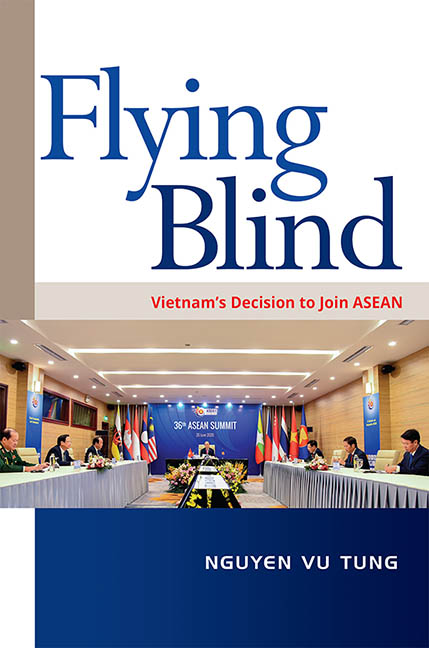Book contents
- Frontmatter
- Contents
- Acknowledgements
- Glossary
- 1 Introduction
- 2 The Paris Agreement and Vietnam: ASEAN Relations in the Early 1970s
- 3 1978 to 1985: Coexistence Between Two Opposing Groups
- 4 Joining ASEAN: Political and Strategic Factors
- 5 Jumping on a Moving Train: Vietnam Joins ASEAN
- 6 ASEAN Membership and Vietnam’s Shifting National Identity
- 7 Conclusion
- References
- Index
- The Author
- Frontmatter
- Contents
- Acknowledgements
- Glossary
- 1 Introduction
- 2 The Paris Agreement and Vietnam: ASEAN Relations in the Early 1970s
- 3 1978 to 1985: Coexistence Between Two Opposing Groups
- 4 Joining ASEAN: Political and Strategic Factors
- 5 Jumping on a Moving Train: Vietnam Joins ASEAN
- 6 ASEAN Membership and Vietnam’s Shifting National Identity
- 7 Conclusion
- References
- Index
- The Author
Summary
In late 2019 Vietnam assumed the ASEAN Chairmanship and introduced the theme of a “Cohesive and Responsive ASEAN”. On this occasion, Vietnam's Prime Minister Nguyen Xuan Phuc stressed,
Throughout its twenty-five years of ASEAN membership, Vietnam has always made active and responsible contributions to ASEAN cooperation. The growth of the ASEAN community bears the hallmarks of Vietnam's work. In 2020, Vietnam will assume major responsibilities at the regional and international level, most notably the ASEAN Chairmanship. Such a responsibility gives Vietnam an opportunity to contribute more substantively to the building and growth of a harmonious, resilient, innovative, cohesive, responsible and adaptive ASEAN Community.
Such an upbeat tone about ASEAN reflected a general consensus in Vietnam that the decision to join ASEAN in 1995 had been a right foreign policy decision of great strategic importance. Moreover, Hanoi has attached greater importance to ASEAN. On 27 August 2019, Nguyen Xuan Phuc told ASEAN Secretary General Lim Jock Hoi that Vietnam always considered ASEAN as one of the most important pillars of its foreign policy. A draft of the Political Report to be introduced at the Communist Party of Vietnam Congress in first quarter of 2021 confirmed the established policy line that Vietnam will be “proactive and responsible with other ASEAN members in the building a strong ASEAN Community and maintaining the central role of ASEAN in regional security architectures”. In short, in retrospect, after twenty-five years, Hanoi's decision to join ASEAN was recognized as the vintage one.
But it had taken almost the same amount of time for Hanoi to change its attitude towards the organization. From the policy of denial, Hanoi gradually adopted the one of peacefully coexisting with, and ultimately embracing ASEAN. Following the open-door reforms programme introduced in 1986 (widely known as Doi Moi), Vietnam began to develop relations with ASEAN. The process of Vietnam-ASEAN rapprochement culminated with Vietnam's signing the ASEAN Treaty of Amity and Cooperation in 1991 and its admission to membership of the organization in 1995—the only formal international organization that the country entered since the end of the Cold War. Myanmar and Laos entered ASEAN in 1997 and Cambodia in 1999. It was acknowledged that after East Timor gained full independence, it too would seek membership in ASEAN.
- Type
- Chapter
- Information
- Flying Blind , pp. 1 - 8Publisher: ISEAS–Yusof Ishak InstitutePrint publication year: 2021

